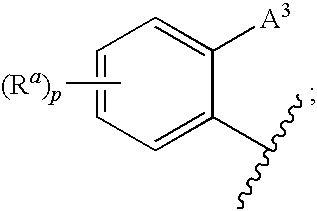1,3-oxazolidin-2-one derivatives useful as CETP inhibitors
a technology of oxazolidin and derivatives, which is applied in the direction of biocide, drug composition, metabolic disorders, etc., can solve the problems of statins only achieving a risk reduction of approximately one-third, and the burden on the health care system is truly enormous
- Summary
- Abstract
- Description
- Claims
- Application Information
AI Technical Summary
Benefits of technology
Problems solved by technology
Method used
Image
Examples
example 1
[0394]
(4S,5R)-5-[3,5-bis(trifluoromethyl)phenyl]-3-{[6′-methoxy-4-(trifluoromethyl)-1,1′:3′,1″-terphenyl-2-yl]methyl}-4-methyl-1,3-oxazolidin-2-one
Step A
[0395]
(4S,5R)-5-[3,5-bis(trifluoromethyl)phenyl]-3-{[5′-bromo-2′-methoxy-4-(trifluoromethyl)biphenyl-2-yl]methyl}-4-methyl-1,3-oxazolidin-2-one
[0396]A mixture of (4S,5R)-5-[3,5-bis(trifluoromethyl)phenyl]-3-[2-iodo-5-(trifluoromethyl)benzyl]-4-methyl-1,3-oxazolidin-2-one (6-80 g, 11.39 mmol), 2-methoxy-5-bromo-phenyl boronic acid (3.00 g, 12.99 mmol), and sodium carbonate (2.65 g, 25.0 mmol) in 200 ml of 1:2:4 mixture of water:EtOH:toluene was stirred at room temperature for 30 min. Catalytic amount of tetrakis(triphenylphosphine) palladium (0.66 g, 5% mol) was added. The mixture was stirred under reflux for 24 h. TLC (CH2Cl2:hexane / 1:1) showed no starting material. The solvents were removed. Water (100 ml) was added. The mixture was extracted with methylene chloride (3×100 ml). The combined methylene chloride layers were washed wit...
example 21
[0400]
Step A
[0401]
(4S,5R)-5-[3,5-bis(trifluoromethyl)phenyl]-3-{[2′-methoxy-5′-(4,4,5,5-tetramethyl-1,3,2-dioxaborolan-2-yl)-4-(trifluoromethyl)biphenyl-2-yl]methyl}4-methyl-1,3-oxazolidin-2-one
[0402](4S,5R)-5-[3,5-bis(trifluoromethyl)phenyl]-3-{[5′-bromo-2′-methoxy-4-(trifluoromethyl) biphenyl-2-yl]methyl}-4-methyl-1,3-oxazolidin-2-one (500 mg, 0.762 mmol), bis(pinacolato)diboron (388 mg, 1.53 mmol), 1,1′-bis(diphenylphosphino)ferrocene-palladium dichloride dichloromethane adduct (150 mg, 0.184 mmol), potassium acetate (150 mg, 1.53 mmol) and 1,4-dioxane (5 mL) were sealed in a microwave vessel. The reaction mixture was irradiated by microwave to 140° C. for 40 minutes. Additional bis(pinacolato)diboron (388 mg, 1.53 mmol) was added followed by microwave irradiation at 140° C. for 20 minutes. Then additional potassium acetate (150 mg, 1.53 mmol) was added followed by microwave irradiation at 140° C. for 20 minutes. The reaction crude was worked up with water. The resulting mixture ...
example 22
[0405]
(4S,5R)-5-[3,5-bis(trifluoromethyl)phenyl]-3-{[6′-chloro-2″-methyl-4-(trifluoromethyl)-1,1′:3′,1″-terphenyl-2-yl]methyl}-4-methyl-1,3-oxazolidin-2-one
Step A
[0406]
(4S,5R)-5-[3,5-bis(trifluoromethyl)phenyl]-3-{[2′-chloro-5′-nitro-4-(trifluoromethyl)biphenyl-2-yl]methyl}-4-methyl-1,3-oxazolidin-2-one
[0407]A mixture of (4S,5R)-5-[3,5-bis(trifluoromethyl)phenyl]-3-[2-iodo-5-(trifluoromethyl)-benzyl]-4-methyl-1,3-oxazolidin-2-one (1.0 g, 1.68 mmol), 2-chloro-5-nitro phenyl boronic acid (0.67 g, 3.3 mmol), tetrakis(triphenylphosphine) palladium (97 mg, 5% mol) and sodium carbonate (0.39 g, 3.68 mmol) in 50 ml of water / EtOH / toluene (1:2:4) was heated to reflux for 4 h. TLC(CH2Cl2:hexane / 1:1) showed that the reaction was complete. The solvents were removed. Water (30 ml) was added. The organic was extracted with methylene chloride (3×40 ml). The combined methylene chloride layers were washed with brine, and dried over sodium sulfate. The title compound was obtained after flash column u...
PUM
 Login to View More
Login to View More Abstract
Description
Claims
Application Information
 Login to View More
Login to View More - R&D
- Intellectual Property
- Life Sciences
- Materials
- Tech Scout
- Unparalleled Data Quality
- Higher Quality Content
- 60% Fewer Hallucinations
Browse by: Latest US Patents, China's latest patents, Technical Efficacy Thesaurus, Application Domain, Technology Topic, Popular Technical Reports.
© 2025 PatSnap. All rights reserved.Legal|Privacy policy|Modern Slavery Act Transparency Statement|Sitemap|About US| Contact US: help@patsnap.com



